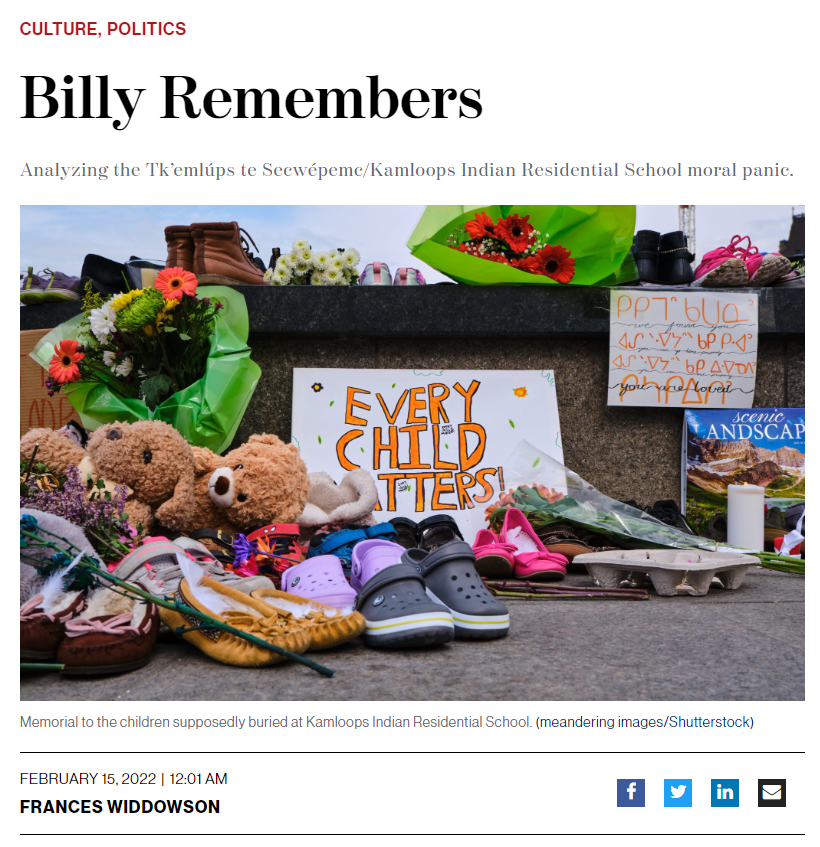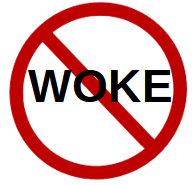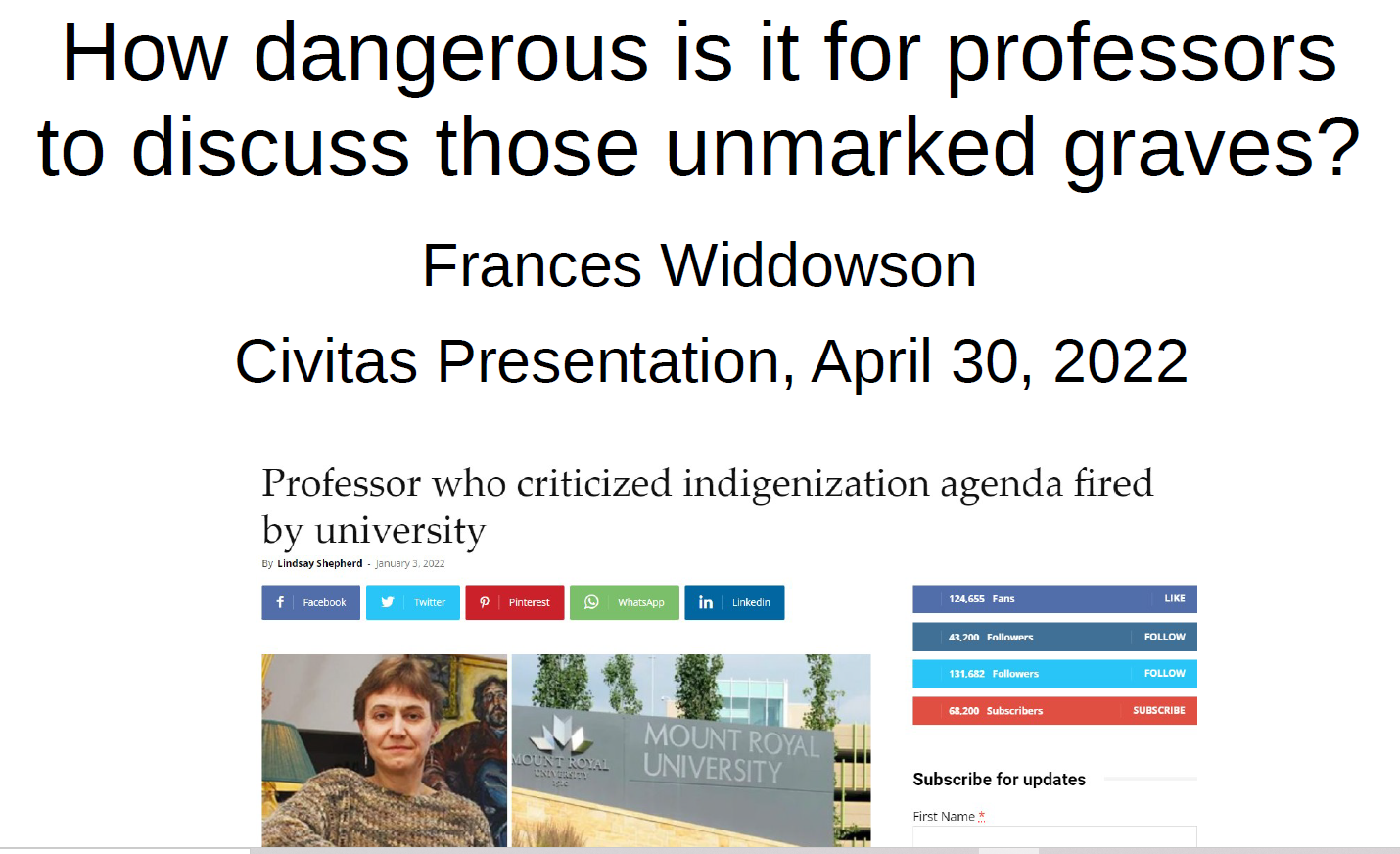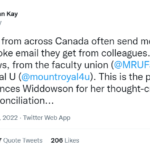Panel 3: Indian Residential Schools and the Issue of “Unmarked Graves”
Presenters: Rodney Clifton, Hymie Rubenstein, and Frances Widdowson
Chair: Tom Flanagan
In May 2019, the Alberta government directed universities to protect open inquiry by developing guidelines that aligned with the Chicago Principles (a document promoting free speech produced by the University of Chicago).
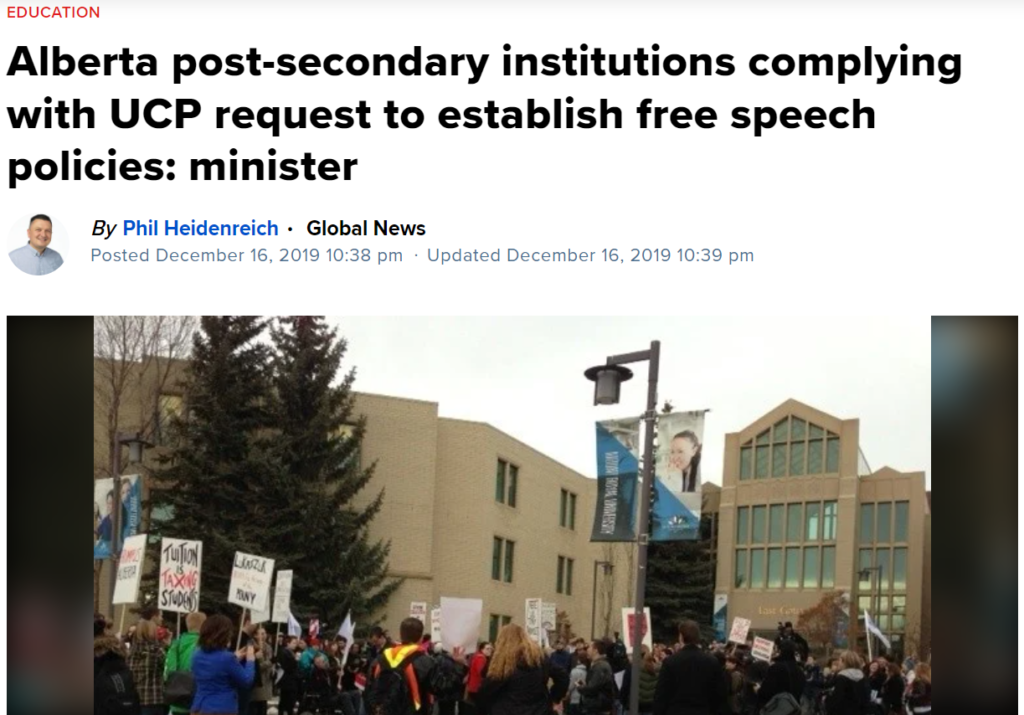
As a result of this directive, Mount Royal University enacted an Expression and Free Speech Policy stating that the university “unequivocally embraces its institutional responsibility to ensure the free and open exchange of ideas”, and “presentations or debate” would not be suppressed even if they were “thought to be offensive, unwise, immoral, extreme, harmful, incorrect or wrongheaded”.

This policy also maintained that no member of the MRU community could “obstruct or interfere with the free speech of others”.

Furthermore, MRU’s Collective Agreement had an “academic freedom” article stating that “[a]cademic staff shall not be hindered or impeded in any way…from exercising their legal rights as citizens” and that they should have “freedom from institutional censorship”. Presumably, these “legal rights as citizens” would include Section 2(b) of The Charter of Rights and Freedoms: “freedom of thought, opinion and expression…”.
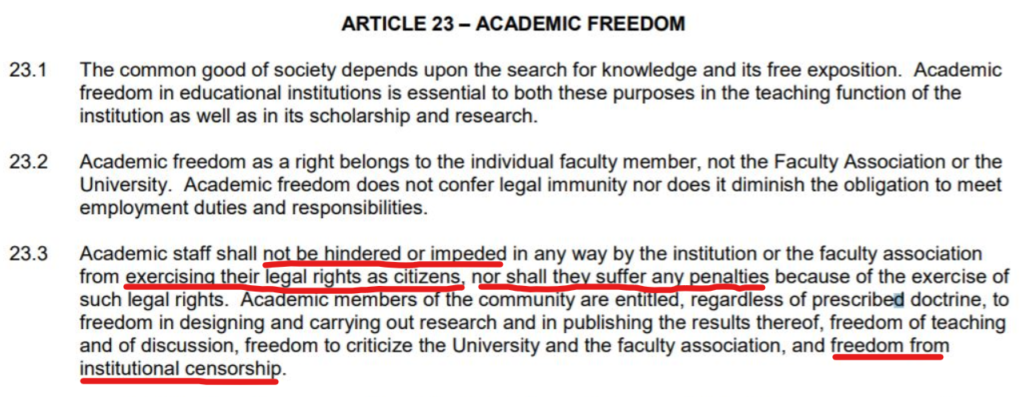
MRU professor Frances Widdowson’s social media commentary on the “unmarked graves” largely unfolded through satirical posts on Twitter. In August 2020, following an attempt by an indigenous studies scholar to mobilize an anonymous alleged student led group against her (see Episode Five), Widdowson turned her Twitter account into the character Frances McGrath (NOT Frances Widdowson) to pursue the truth through satire. The character was modelled on Titania McGrath – a satirical character created by the British comedian Andrew Doyle.
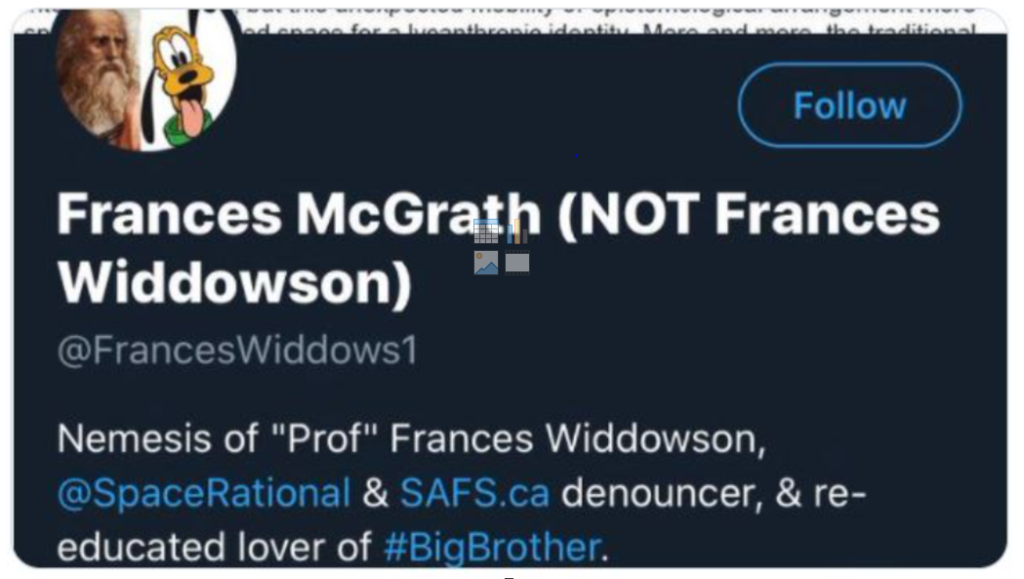
Widdowson’s commentary about the “unmarked graves” began after May 27, 2021, when CFJC Today Kamloops broke the story that “Tk’emlups confirms bodies of 215 children buried at former #Kamloops Indian Residential School site”.
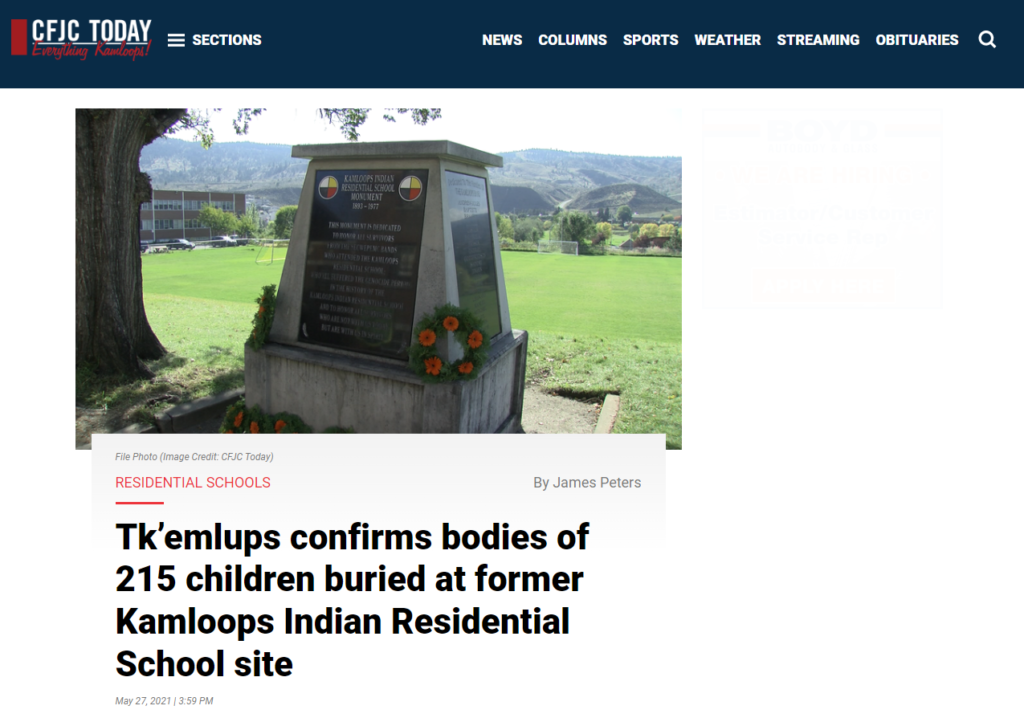
This resulted in a former MRU indigenous studies scholar stating, on May 28, 2021, that “215 little ones…were murdered in that residential school”
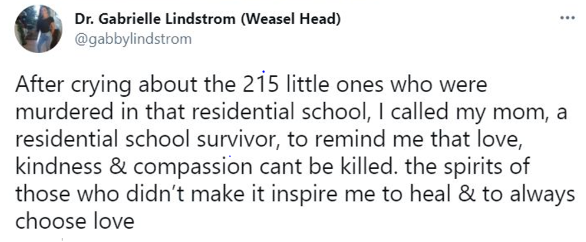
University of Manitoba history professor Sean Carleton retweeted the CFJC Today Kamloops story with the comment that “the community had a feeling and the discovery confirms what many of us know to be the truth: that the residential school system was genocidal and its effects are ongoing”. This led The Dorchester Review to point out that the death of indigenous children was often due to “tuberculosis or some other disease”. In response to this factual assertion, the former MRU professor stated the following: “In case you needed any more proof that the Dorchester Review is just a straight up garbage, genocide denialism outfit. Trolling dead children is repugnant, you absolute ghouls”.
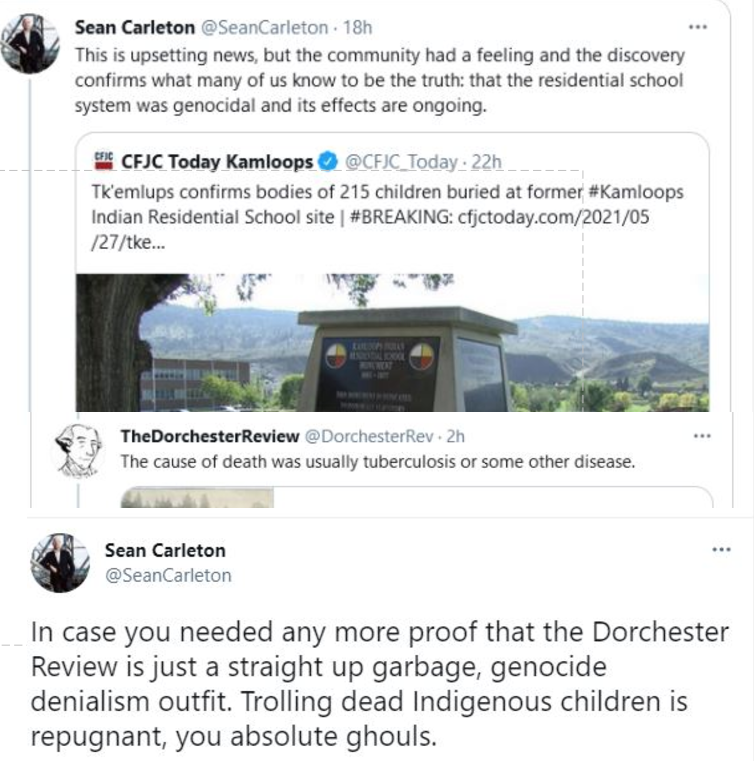
Dr. Carla Peck, an education professor at the University of Alberta, also reacted to other tweets by The Dorchester Review that questioned allegations about a “mass grave”, “murders” and “genocide”. She encouraged Premier Kenney and Minister LaGrange to denounce the editor of The Dorchester Review, Chris Champion. “Standing by Champion”, according to Peck, was “disgust[ing]” because it meant that Kenney and LaGrange were “uphold[ing] racism and hate”.

To this tweet, Peck attached The Dorchester Review‘s replies to a Tweet by Ryerson University history professor Ian Mosby.
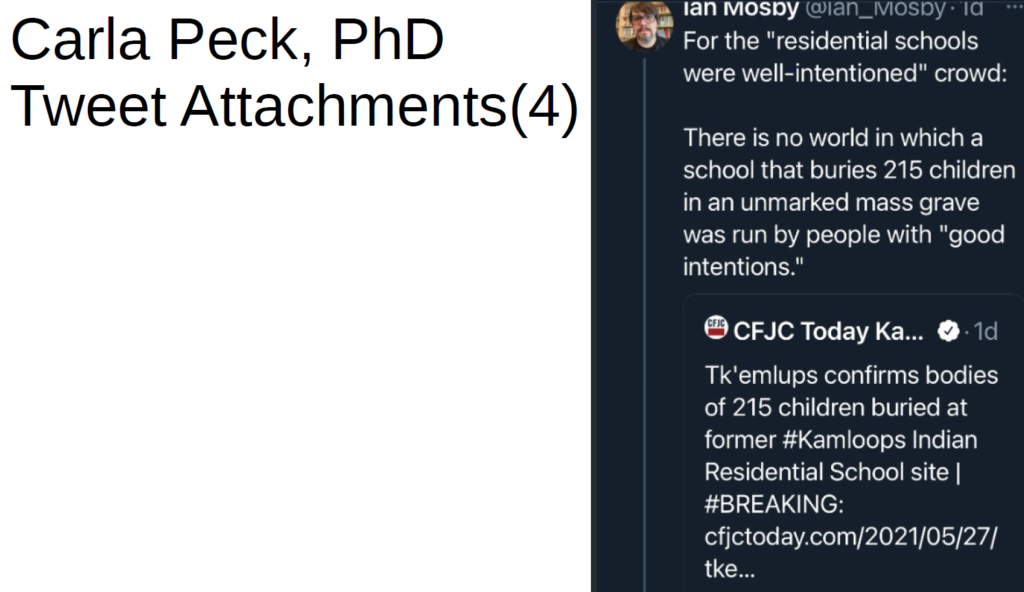
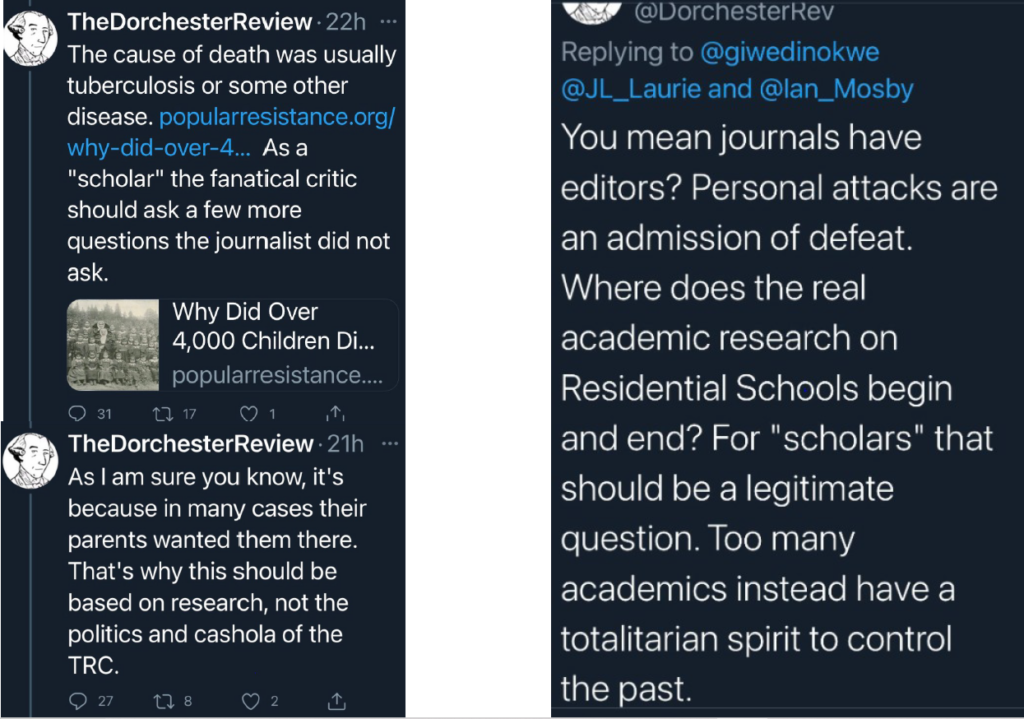
This led Widdowson to engage in satire with her character. The satire deployed the words used in previous tweets – “hate”, “mass graves”, “killing fields”, and “ghouls” – in a slightly exaggerated fashion.
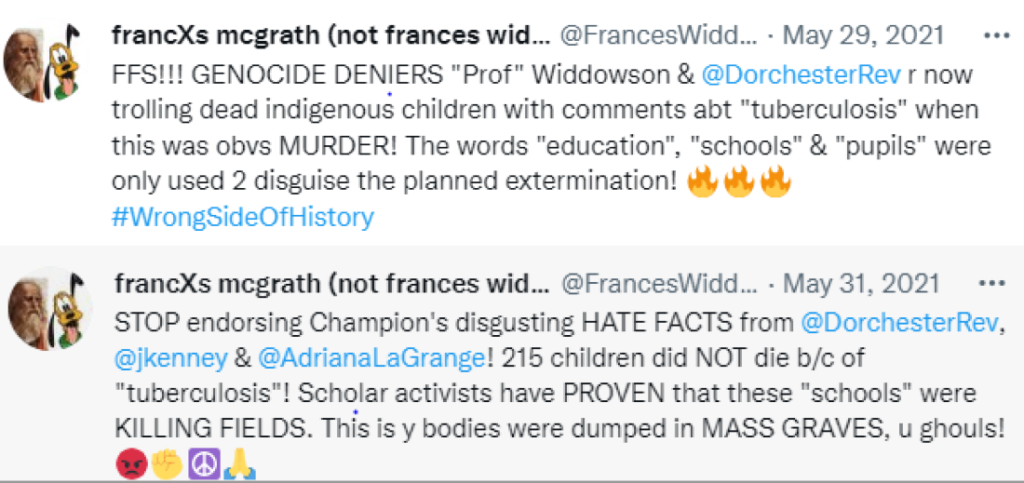
On June 10, MRU President Tim Rahilly stated that there had been a “heartbreaking discovery of 215 children buried in unmarked graves at a former Kamloops residential school”. He urged people to stop and reflect on the impact that this was having, and to help people who were grieving the most.
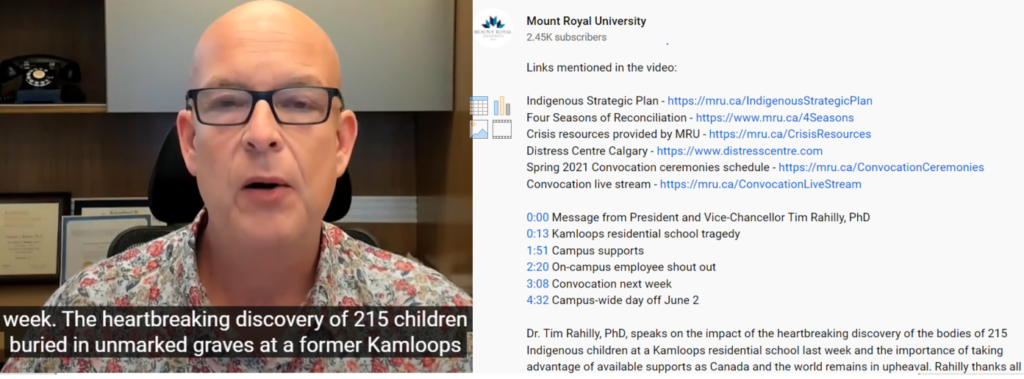
On June 12, Widdowson responded on her Facebook page to a controversy about an article written by Brian Giesbrecht in the Winnipeg Sun. Giesbrecht urged people not to rush to judgment “without all the facts”, as there were many abandoned cemeteries in Canada. The fact that cemeteries were forgotten did not mean that something sinister had occurred, according to Giesbrecht. Giesbrecht cautioned that this could be the situation in the Kamloops case.
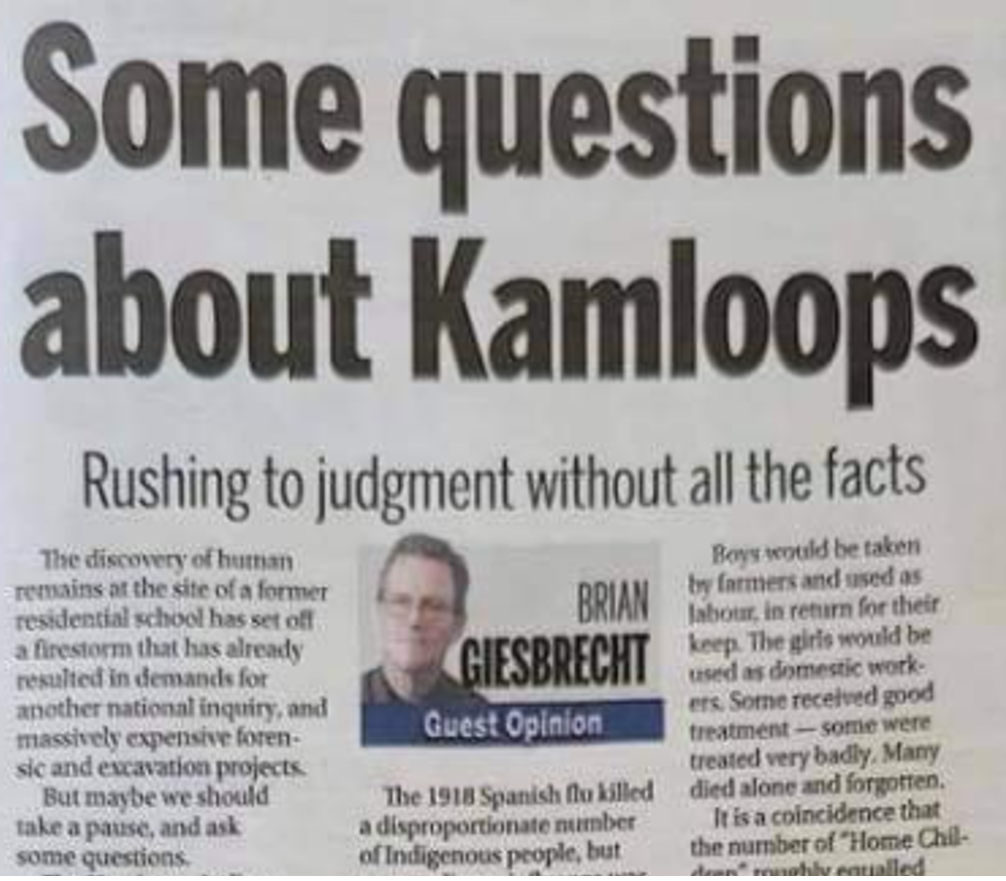
In response to Giesbrecht’s column, an indigenous leader referred to his arguments as “hateful”, “callous”, “drivel” and a “denial of the atrocities inflicted upon Indigenous peoples”. The leader stated that no more interviews would be granted to the media outlet because of it, and an apology was demanded. Giesbrecht’s column was then removed from the Winnipeg Sun‘s website.
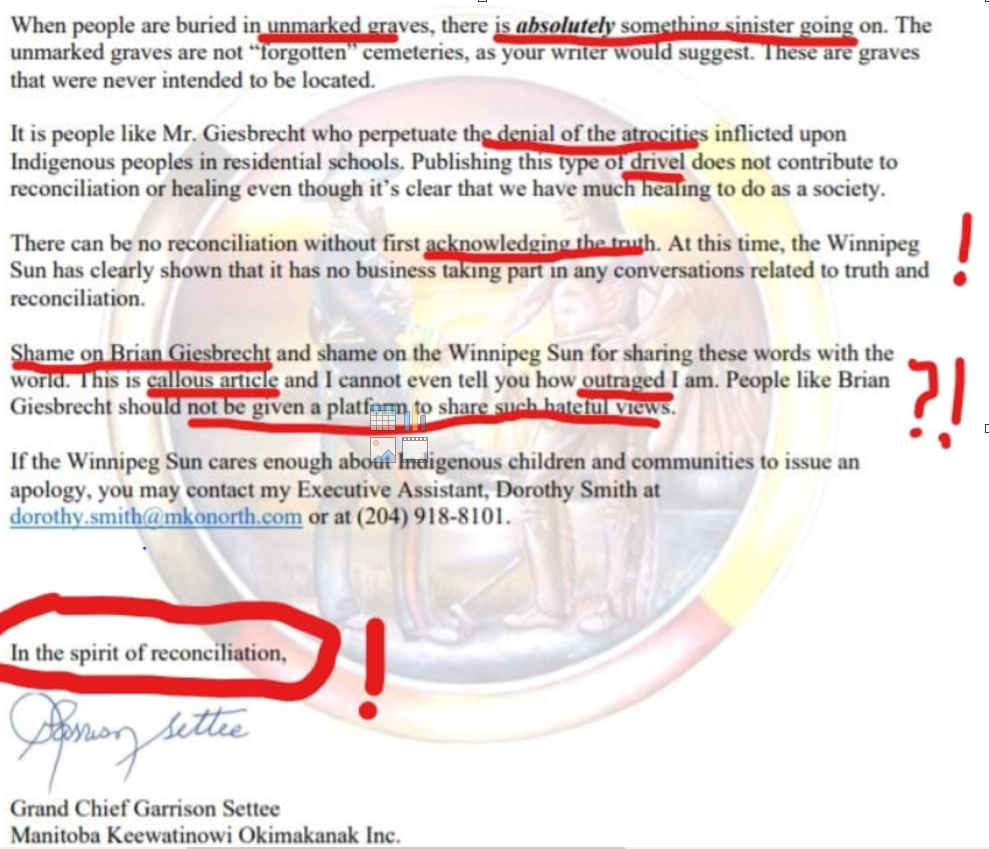
This led Widdowson to provide commentary about the response to Giesbrecht’s column on her Facebook page. She maintained that this was indicative of “the creeping totalitarianism of wokeism”, as not even one dissenting view could be allowed.
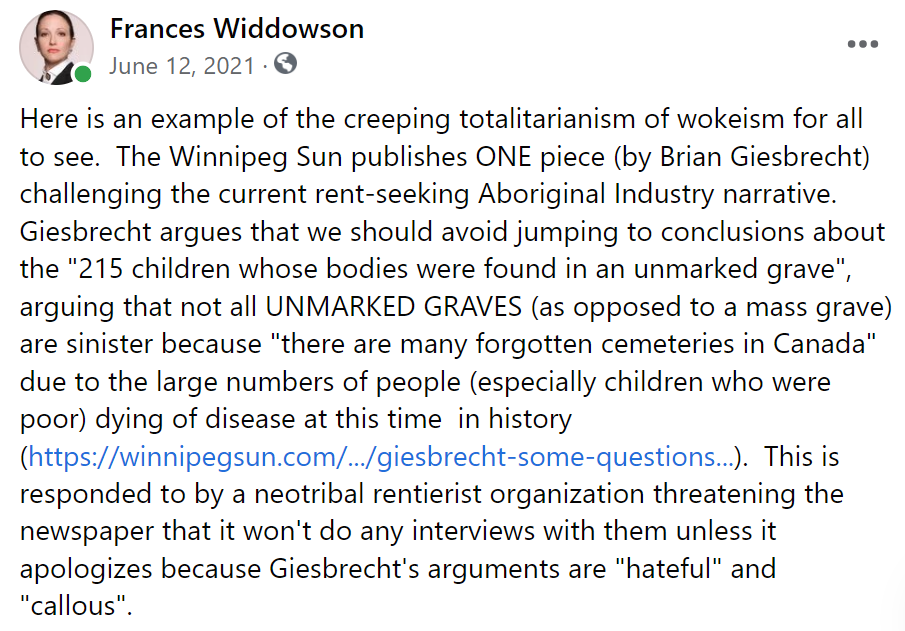
Widdowson then satirized her own position on Twitter. With two Tweets, she attempted to expose, in a satirical way, the irrational and rent-seeking character of the claims of neotribal elites and their legal brokers.
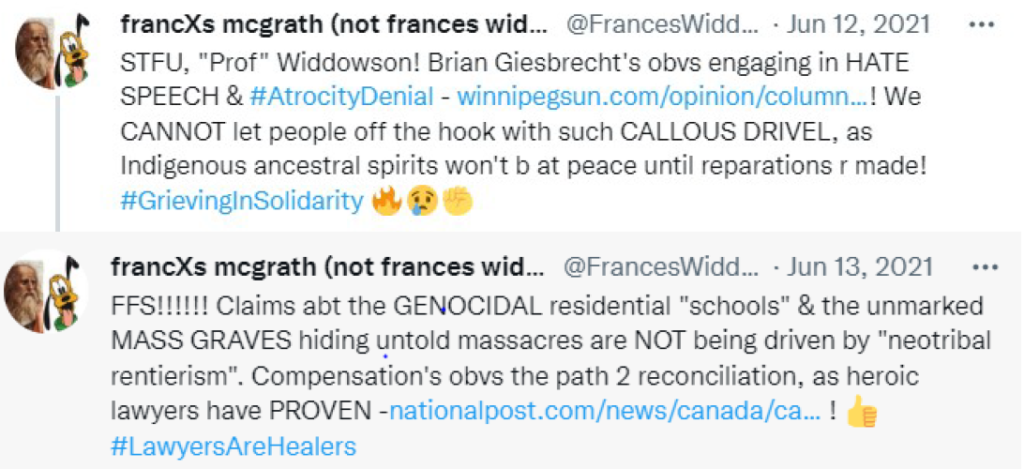
On June 14, a former MRU indigenous studies scholar asserted that she had “‘colleagues’ who mock my peoples suffering in ways that are completely acceptable by Universities”.

After this tweet was posted, an MRU professor maintained that “universities must absolutely fire racists who deny the real harm of the residential schools for indigenous peoples”, as “kowtowing to them undermines everything a university does for decolonization”.
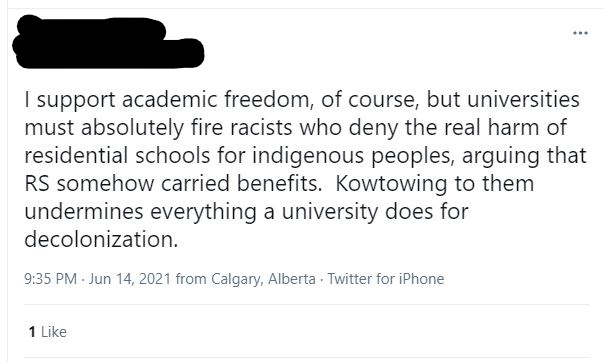
On June 17, Chris Champion, the editor of The Dorchester Review, stated that it was misleading to compare the Kamloops Indian Residential School to the holocaust, and imply that children were deliberately killed. This led Dr. Carla Peck to state that “James Keegstra was a Holocaust-denying classroom teacher”, implying that his views were similar to those of “a genocide-denying consultant…” (i.e. Champion).
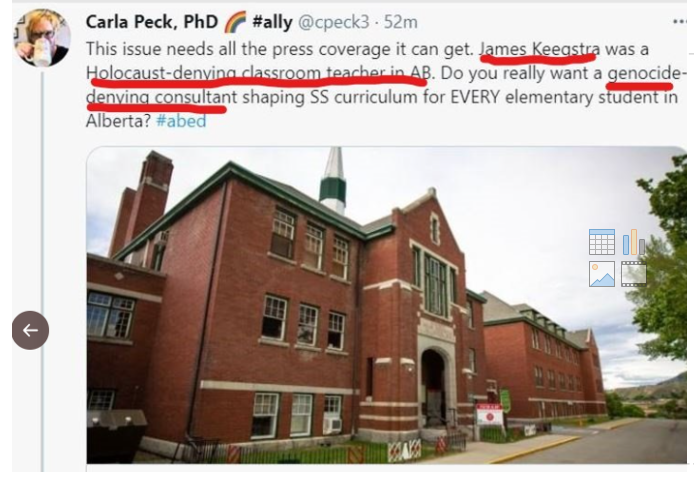
Peck also referred to the work of Dan Panneton, who stated that “holocaust deniers often use the existence of a swimming pool at Auschwitz to undermine accusations of genocide”. The CBC story asserted that Panneton claimed that there were “parallels between the Dorchester Review tweets and the rhetoric of Holocaust deniers”.
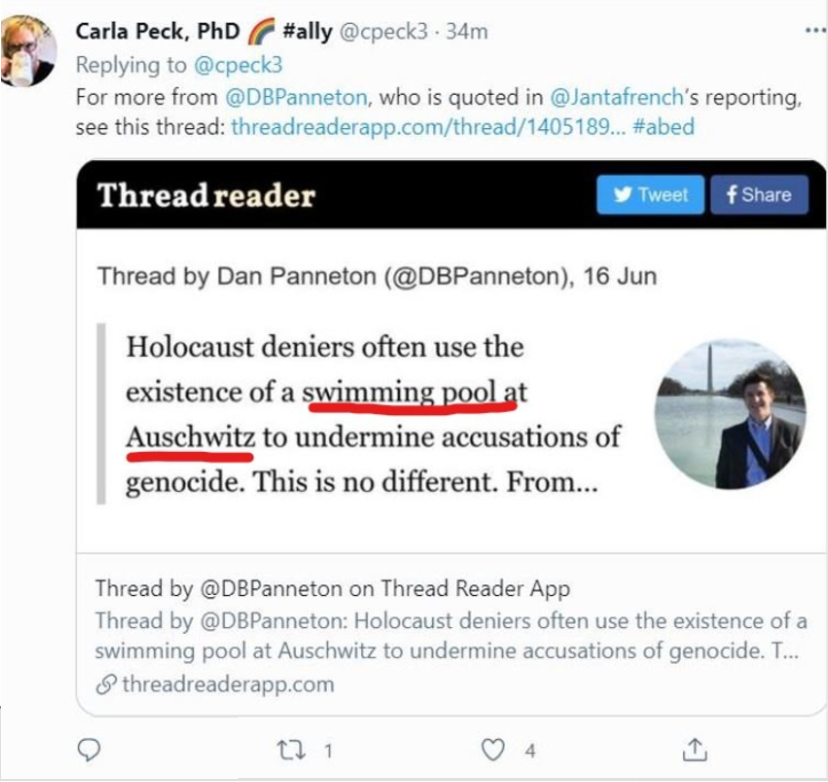
This comparison of Champion to Keegstra, as well as the implication that residential schools were similar to concentration camps like Auschwitz, led Widdowson to satirize Peck’s posts.

After the announcement that 751 unmarked graves had been found in a cemetery by the Cowessess First Nation, University of Manitoba history professor Sean Carleton began to take people to task for their plans to celebrate Canada Day. He called Erin O’Toole a “ghoul” for encouraging this, stating that “the country should be grieving, not celebrating”. Those who “get indignant” and “dig in [their] heels about unreservedly celebrating Canada”, in his view, illustrated why the horrors of the residential schools were perpetrated for over a hundred years.
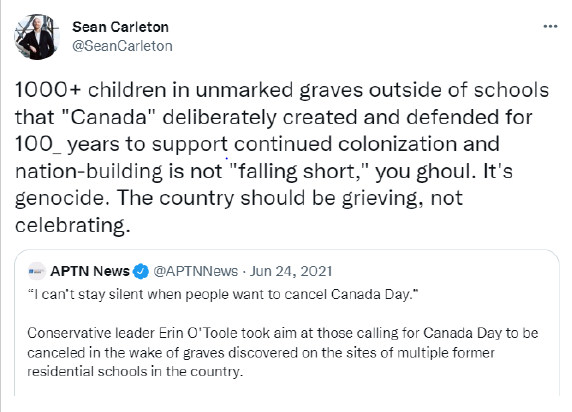
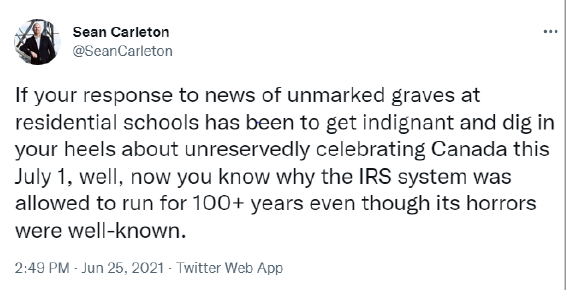
This led Widdowson to satirize those who were castigating people planning to celebrate Canada Day. Widdowson also was trying to draw attention to what she perceived to be the absurdity of comparing the residential schools to concentration camps, as well as the inference that Canada was a genocidal state like Nazi Germany.
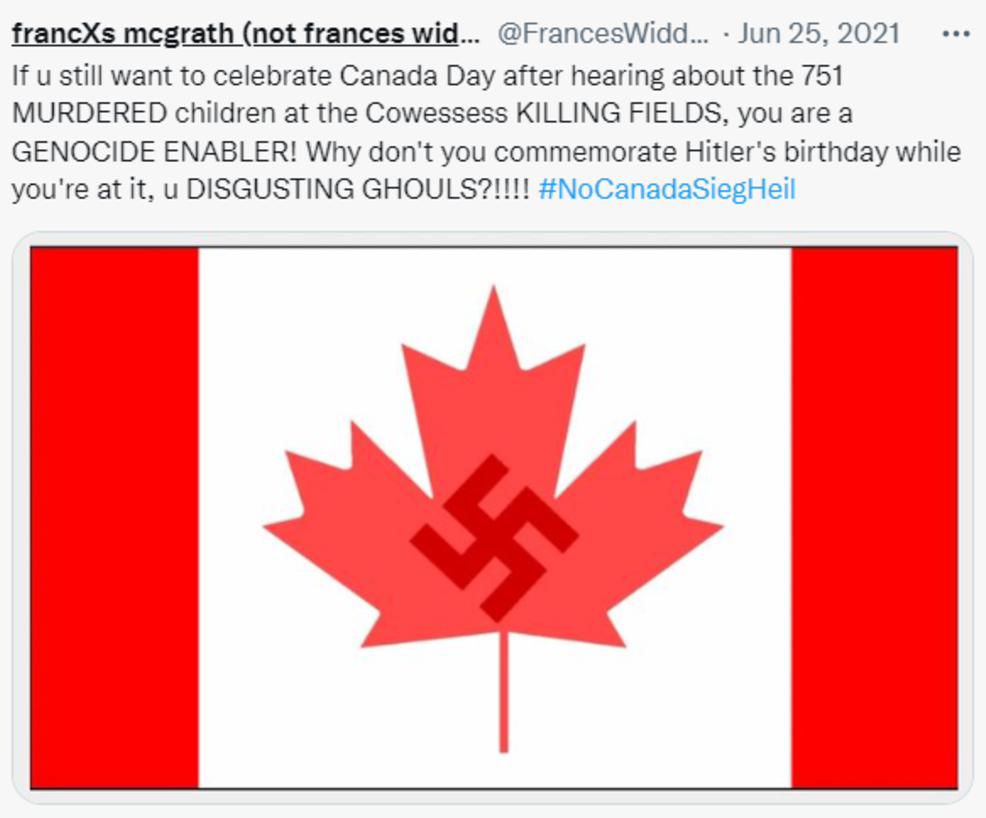
Widdowson also began to notice Tweets about Canada Day with the #KKKanada hashtag.
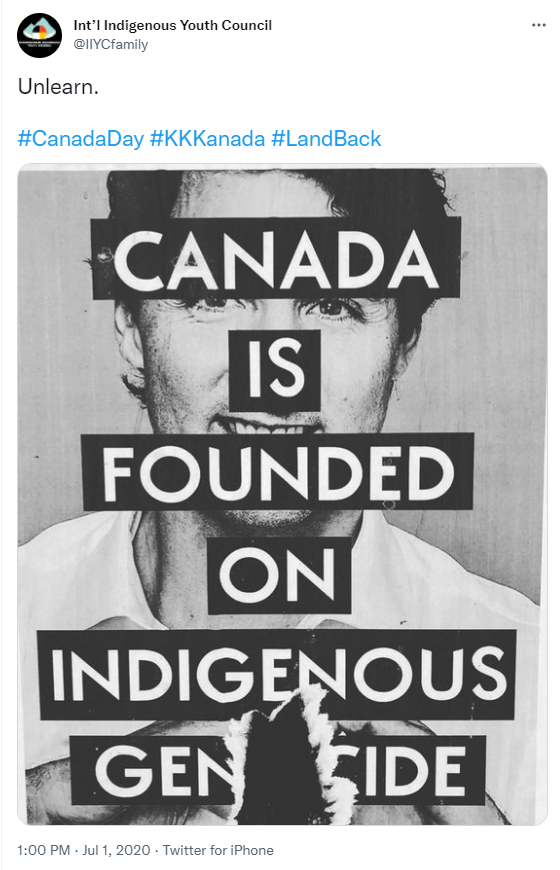
This led Widdowson to satirize the connection between Canada Day and the rallies of the Klu Klux Klan.
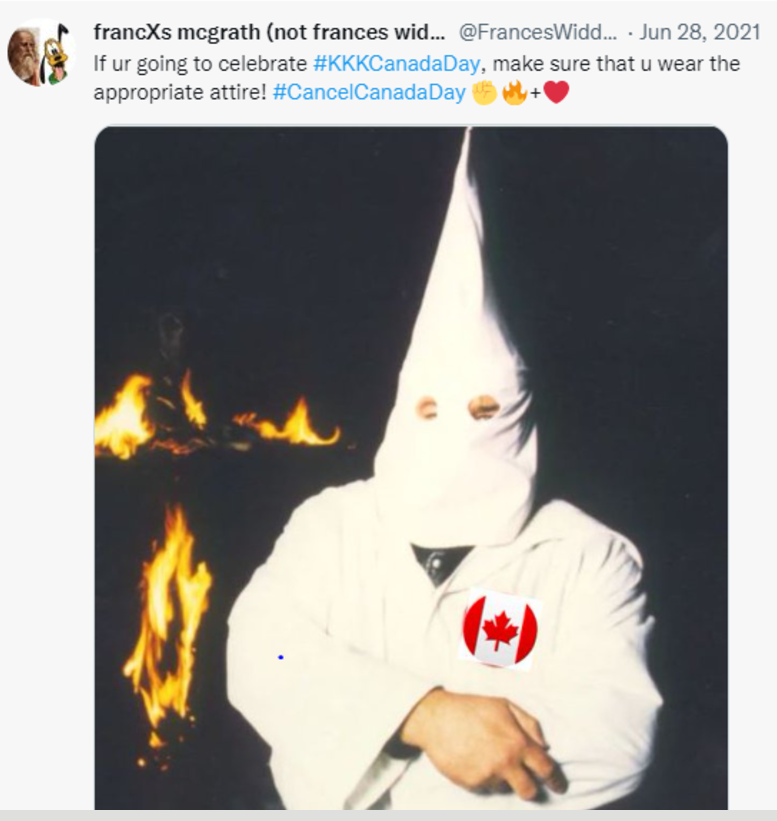
As a result of her Tweets, the Students’ Association of MRU (SAMRU) issued a press release condemning Widdowson’s comments on social media that it claimed were “mocking the unmarked graves of Indigenous children”. It argued that her Tweets showed that she was “misus[ing] academic power”, “demonstrat[ing] a tolerance for lethal behaviour”, and creating a “culture of fear” on campus. There should be “alternatives for certain required courses”, SAMRU asserted, as Widdowson’s Tweets raised questions about whether students would be “treated and graded fairly”.
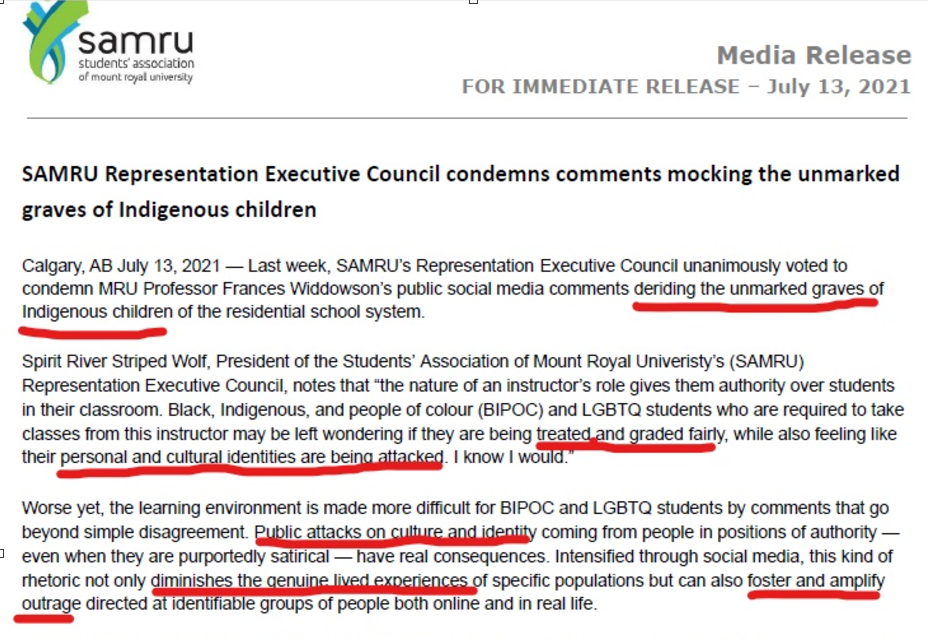
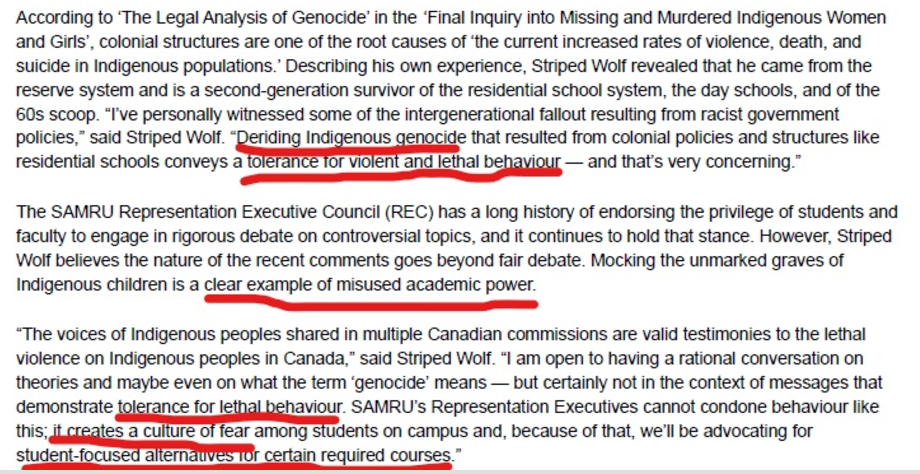
Two of the “examples” given for why Dr. Widdowson was fired concerned the comments that she had made with respect to the discovery of “unmarked graves” at indigenous residential schools. In referring to these “complaints and concerns”, MRU mentioned “a media release from SAMRU [Students’ Association of Mount Royal University] condemning [Widdowson’s] social media comments in July of 2021”.

On February 15, 2022, a number of months after participating on a panel on the unmarked graves and working with a research group on the residential schools, Widdowson published “Billy Remembers” on the Kamloops case. This essay documented the lack of evidence for the allegations about the “remains of 215 children” being “discovered”. The essay argued that the acceptance of these improbable claims showed some similarities to the hysteria that was created during the Satanic abuse moral panic in the 1980s and 1990s. The acceptance of there being 215 children buried clandestinely in an apple orchard had been made possible by “woke” academics and journalists. Political opportunism also played a part in accelerating the moral panic.
